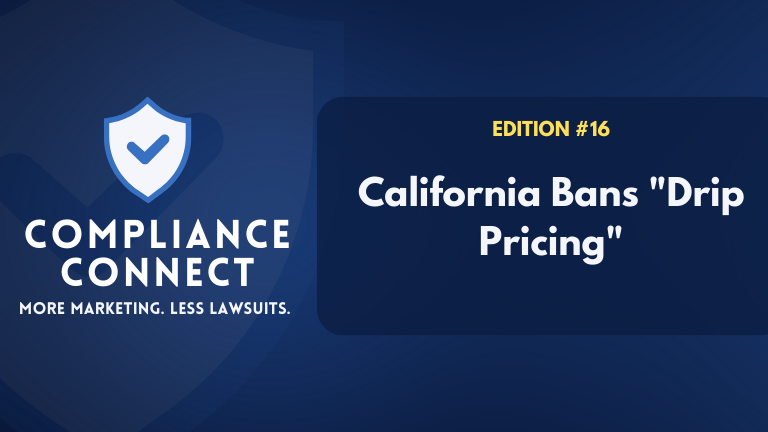Good morning! This is the sixteenth edition of the Compliance Connect newsletter.
The goal is simple: to keep you in the loop on what the FTC and other regulatory agencies are up to so that you can protect yourself.
These newsletters will land in your inbox twice a week – Mondays and Thursdays.
Remember: this is NOT legal advice, only information!
Here’s the rundown today…
- 🚨 Compliance Challenge This Week!
- 🏷️ California Bans “Drip Pricing”
- 🌿 FTC Targets Keto And CBD Marketers
- 🍗 Why Did The FTC Target KFC?
- 💼 How Business Opportunities Are Regulated
Compliance Digest: What You Should Read Today
California Bans “Drip Pricing” As A Part Of A Larger Trend
This is an older story, but it speaks to a larger trend…
In July, a new California law went into effect targeting “drip pricing.” This new law requires businesses to include all mandatory fees in advertised prices, rather than only revealing them at checkout.
This law applies broadly to companies selling goods or services to California consumers, including those based out-of-state AND online businesses.
The goal is to prevent hidden fees from being revealed only at checkout, ensuring price transparency for consumers.
All businesses are included EXCEPT restaurants. Violators may face legal claims and penalties.
The FTC has also moved to ban “junk fees.” There is clearly a growing regulatory trend that businesses and marketers should watch closely.
FTC Settles With Marketers Of Keto And CBD-Related Products
In September, the FTC settled with companies accused of unauthorized billing and credit card laundering by defendants marketing CBD and keto-related products.
They allegedly enrolled consumers into unwanted continuity programs, violating Section 5 of the FTC Act, the Restore Online Shoppers’ Confidence Act (ROSCA), and the Electronic Funds Transfer Act (EFTA).
Monetary judgments totaling $63 million were imposed, and the defendants must forfeit approximately $40 million in assets.

Case Breakdown: KFC
Today we’re going to quickly break down an interesting case from 20 years ago involving a popular fast food chain.
KFC, of course, is best known for its fried chicken.
In the early 2000’s, they tried to position themselves as a HEALTHIER alternative to other fast food chains.
Is fried chicken healthier than a cheeseburger? Not really.
That’s why, in 2004, the FTC brought an administrative action against KFC of making false claims in a national advertising campaign.
The company was accused of making unsubstantiated claims about its fried chicken’s nutritional value, weight-loss benefits, and other health benefits.
One of the advertisements that the FTC flagged claimed that eating KFC fried chicken was healthier than eating a Burger King Whopper.
The problem is that while KFC’s fried chicken had slightly less total fat, it did have more trans fat, cholesterol, sodium and calories.
Another said that eating fried chicken was compatible with a low-carb diet.
Of course, most low-carb diets DO NOT recommend eating breaded chicken!
KFC wasn’t punished severely for these violations. They were simply prohibited from making claims about its chicken products’ nutritional value, weight loss benefits, or other health benefits that it cannot substantiate.
Read the full administrative action here.
A KFC spokesperson in 2004 said that the company believed their ads were “truthful and factually accurate” and decided to settle the case without admitting any fault.
Did You Know…
According to the FTC, Best Buy/Geek Squad, Amazon, PayPal are the most frequently impersonated companies by scammers.

Quick Compliance Tip: Business Opportunities
Many readers of this newsletter are in the business opportunity space. There are many great businesses in this industry, but it’s also one that the FTC and other regulators have focused on.
If you’re in this space, then you need to make sure you PRIORITIZE COMPLIANCE because it wouldn’t take much for you to become the target of an investigation or lawsuit.
State Laws
In the late 1970s, several states began establishing Business Opportunity Disclosure (BODA) laws or Seller Assisted Marketing Plans Acts (SAMP).
These laws were specifically created to regulate businesses, such as franchises and “make money” programs sold on infomercials.
In the early 2000s, the FTC and several states started using these same 1970s laws to govern education about making money that was being sold online.
Today, about 23 states have BODAs or SAMPs.
For example, the California SAMP Act requires all “SAMPS” to offer a three-day right of rescission (right to cancel).
Companies who fail to offer this right are liable to California prosecutors and private or even class action lawsuits.
The FTC
The FTC also has similar business opportunity provisions that it enforces nationwide.
Over the years both the FTC and state regulatory bodies have expanded the scope of business opportunity laws to include many money-making informational offerings, including but not limited to:
- Real estate education
- Amazon and Walmart businesses
- Crypto currency offerings
- Lending practices
The main complaint? Unsubstantiated claims that are not typical results. Misuse of testimonials that are not typical and high-pressure sales techniques used on the phone (telesales).
If you provide done-for-you business opportunity services, you are also subject to the Business Opportunity Rule.
Under this rule, sellers of business opportunities must give potential buyers specific details to aid in their evaluation.
This helps buyers understand the risks of acquiring a work-at-home program or similar business opportunities.
